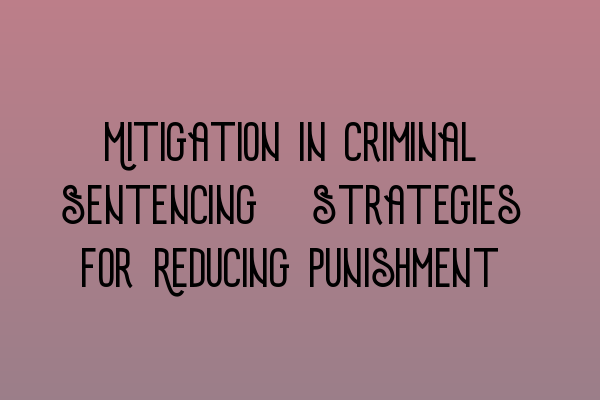Mitigation in Criminal Sentencing: Strategies for Reducing Punishment
When it comes to criminal prosecutions, one of the key stages of the process is sentencing. The court’s decision on the appropriate punishment for an individual can have a significant impact on their future. However, it is important to remember that there are often opportunities for mitigation, which can help reduce the severity of the sentence imposed.
What is Mitigation?
Mitigation refers to the act of presenting evidence or arguments to the court that can potentially lead to a reduced sentence. It is a crucial part of the criminal defense process and can make a significant difference in the outcome of a case. Mitigation strategies can range from highlighting the defendant’s personal circumstances to demonstrating remorse and rehabilitation efforts.
One effective mitigation strategy is to emphasize the defendant’s lack of criminal history or low risk of reoffending. This can be achieved by presenting evidence of the defendant’s good character and reputation within their community. Additionally, highlighting any positive contributions they have made to society can further strengthen their case for leniency.
The Importance of Effective Mitigation
Effective mitigation can lead to a reduced sentence, allowing the defendant to avoid the most severe consequences of their actions. This can include shorter prison terms, reduced fines, or alternative sentencing options, such as community service or rehabilitation programs.
Moreover, successful mitigation can also help in preserving the defendant’s reputation and future prospects. A lesser sentence can prevent long-term damage to their personal and professional life. As a result, skilled criminal defense solicitors invest considerable effort into building compelling mitigation cases on behalf of their clients.
Strategies for Effective Mitigation
1. Presenting Personal Circumstances: Highlighting any difficult life circumstances that may have contributed to the defendant’s actions can help the court understand the context in which the offense occurred. This can include factors such as poverty, addiction, or mental health issues. It is important to gather evidence and present it in a persuasive and sympathetic manner.
2. Demonstrating Remorse: Expressing genuine remorse for the offense committed is a powerful mitigation strategy. This can be achieved through written apologies or statements, as well as arranging counseling or rehabilitation programs to address any underlying issues. Providing evidence of efforts made to amend for the offense can greatly impact the court’s perception of the defendant.
3. Offering Compensation or Restitution: If the offense resulted in financial harm to the victim, offering compensation or restitution can show the defendant’s willingness to make amends and take responsibility for their actions. This can also demonstrate their commitment to rehabilitative efforts.
4. Expert Testimony: In some cases, expert witnesses can provide important insights into the defendant’s circumstances or behavior. This can be particularly relevant when dealing with mental health issues, addiction, or other significant factors that contributed to the offense. Expert testimony can strengthen the mitigation case and influence the court’s decision.
Conclusion
Effective mitigation strategies are essential in criminal sentencing to reduce the severity of punishment. By employing tactics such as presenting personal circumstances, demonstrating remorse, offering compensation, and utilizing expert witness testimony, solicitors can significantly influence the court’s decision. The goal is to secure the best possible outcome for their clients, ensuring fair and just punishment while also considering the individual’s unique circumstances.
If you are preparing for the SQE 1 or SQE 2 exams, be sure to check out our related articles for valuable resources:
- SQE 1 Practice Exam Questions
- SQE 1 Practice Mocks FLK1 FLK2
- SQE 2 Preparation Courses
- SQE 1 Preparation Courses
- SRA SQE Exam Dates
